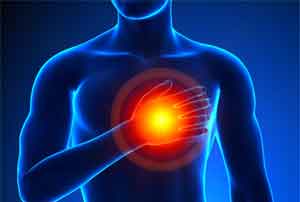- Home
- Editorial
- News
- Practice Guidelines
- Anesthesiology Guidelines
- Cancer Guidelines
- Cardiac Sciences Guidelines
- Critical Care Guidelines
- Dentistry Guidelines
- Dermatology Guidelines
- Diabetes and Endo Guidelines
- Diagnostics Guidelines
- ENT Guidelines
- Featured Practice Guidelines
- Gastroenterology Guidelines
- Geriatrics Guidelines
- Medicine Guidelines
- Nephrology Guidelines
- Neurosciences Guidelines
- Obs and Gynae Guidelines
- Ophthalmology Guidelines
- Orthopaedics Guidelines
- Paediatrics Guidelines
- Psychiatry Guidelines
- Pulmonology Guidelines
- Radiology Guidelines
- Surgery Guidelines
- Urology Guidelines
Givinostat may be future treatment for heart failure

The researchers at the University of Colorado School of Medicine led by CU faculty members Mark Y. Jeong tested the effect of an investigational drug called givinostat in treating diastolic dysfunction and found that Givinostat tested in rat and mouse models, helped the heart relax properly. This finding holds promise for treating patients with diastolic dysfunction and HFpEF.The researchers seem to have identified a potential treatment target for patients with a common type of heart failure.The study has been published in the journal Science Translational Medicine
HFpEF refers to cases where the heart can pump blood normally but is not able to fill as efficiently as a healthy heart. Millions of people worldwide suffer from HFpEF, which can be caused by hypertension, diabetes, aging or other conditions. Individuals with HFpEF die at an alarming rate and, unfortunately, there are no effective drugs to treat this form of heart failure.
By studying of the hearts of patients with diastolic dysfunction and HFpEF, the research team found that fibrosis, the commonly suspected culprit in these cases, is not the sole cause of diastolic dysfunction. Instead, their findings indicated that there was a defect in the ability of the muscle cells of the heart to relax.
To address whether this defect in the muscle cells could be treated, the researchers, led by CU faculty members Mark Y. Jeong, MD, assistant professor of medicine, and Timothy A. McKinsey, PhD, associate professor of medicine, tested whether givinostat might improve the heart's ability to relax in the face of hypertension or aging. They found that the investigational drug, tested in rat and mouse models, helped the heart relax properly. Thus, the findings hold promise for treating patients with diastolic dysfunction and HFpEF.
"These are exciting findings because we may be able to help patients with a form of heart failure that has been recalcitrant to standard-of-care therapies," said McKinsey. "Givinostat is currently in clinical development for the treatment of muscular dystrophy. Our data suggest the possibility that givinostat could be 'repurposed' for the treatment of HFpEF. Obviously, it is early days, but we are excited to test givinostat in a large animal model of HFpEF as the next step toward translating our findings to humans. Our data also reveal relaxation impairment of muscle cells as a previously unrecognized process that contributes to diastolic dysfunction of the heart. Thus, other therapeutic strategies that improve this defect could also be useful for the treatment of HFpEF".
For more details click on the link: http://dx.doi.org/10.1126/scitranslmed.aao0144

Disclaimer: This site is primarily intended for healthcare professionals. Any content/information on this website does not replace the advice of medical and/or health professionals and should not be construed as medical/diagnostic advice/endorsement or prescription. Use of this site is subject to our terms of use, privacy policy, advertisement policy. © 2020 Minerva Medical Treatment Pvt Ltd